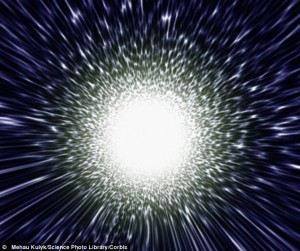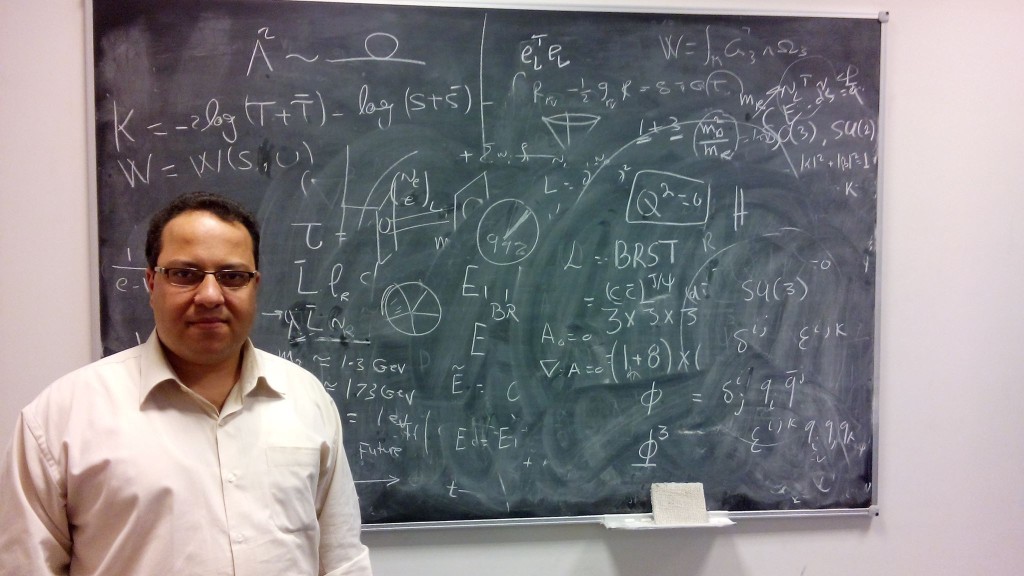Ahmed Farag Ali – Big Bang Singularity
Is it possible that the universe had no beginning?
New research from a team of physicists is questioning some Big Bang theories. Ahmed Farag Ali, a professor with many academic affiliations, discusses his findings.
Ahmed Farag Ali, got his PhD in 2012 from University of Lethbridge, Canada and got in 2007 the ICTP Diploma from Abdus Salam International Center for theoretical physics, Trieste, Italy. got B.Sc from Benha University, Egypt. Currently, he is on leave from Benha University and is a visiting assistant professor at Florida State University.
Big Bang Singularity
![]()
It is widely known that Einstein theory of Relativity is successful in describing astrophysical and cosmological phenomena.
According to to the theory, Physical laws must be defined at every point in the space-time.
 However, the theory has a serious physical and mathematical problem known as Big Bang Singularity. Big Bang Singularity predicts that our universe began from an infinitely dense point at which the laws of physics break down.
However, the theory has a serious physical and mathematical problem known as Big Bang Singularity. Big Bang Singularity predicts that our universe began from an infinitely dense point at which the laws of physics break down.
This means the theory contains its own contradiction.
In this study, we compute quantum corrections to the dynamical equation of the universe known as the Freidman equations. By replacing classical geodesics with quantal (Bohmian) trajectories.
This quantum approach was developed by Louis de Broglie and David Bohm .
This gives rise to a new correction terms which substantially changes the behavior of the universe.
The quantum trajectories can never meet or cross.
Therefore extrapolating points in our current universe far back in the past, they no longer meet in a Big Bang singularity. That means that they go on forever.
 In other words, there is no singularity, no starting point and point at the possibility that the universe had no beginning.
In other words, there is no singularity, no starting point and point at the possibility that the universe had no beginning.
“One of our correction terms to the Raychaudhuri/Friedmann equations, which govern cosmology, can be interpreted as due to a all pervading quantum fluid, known as Bose-Einstein condensate.
The density of this fluid may account for dark matter, while the term itself may give rise to a cosmological constant term which accounts for observed dark energy.”
Much is still unknown about the universe where we live, but our research is working to unlock the infinite cosmological mysteries that govern our solar system and beyond.




The work of A. Farag and S. Das concerning the big bang is completely wrong and this was shown in a peer reviewed journal
Mod. Phys. Lett. A, Vol. 31, No. 7 (2016) 1650044
http://www.worldscientific….
https://arxiv.org/abs/1505….
Here is the abstract
%%%%%%%%%%%%%%%%%%%%%%%%%%%%%%%%%%%%%%%%%%%%%%
We examine in detail the cosmology based on quantal (Bohmian) trajectories as suggested in a recent study arXiv:1404.3093[gr-qc]. We disagree with the conclusions regarding predicting the value of the cosmological constant Λ and evading the big bang singularity. Furthermore, we show that the approach of using a quantum corrected Raychaudhuri equation (QRE), as suggested in arXiv:1404.3093[gr-qc], is unsatisfactory, because, essentially, it uses the Raychaudhuri equation, which is a kinematical equation, in order to predict dynamics. In addition, even within this inconsistent framework, the authors have adopted unjustified assumptions and carried out incorrect steps leading to doubtful conclusions.
%%%%%%%%%%%%%%%%%%%%%%%%%%%%%%%%%%%%%%%%%%%%%%%%%%%%%%%%%%%%%
Even the basic theme of the paper about quantum Raychaudhuri equation done by Saurya Das (supervisor of Ahmed Farag) was also shown to be completely wrong in Phys. Rev. D 95, 068501 (2017). This is the same journal where Saurya Das published his work on quantum Raychaudhuri equation .
Here is the link and abstract for the paper that invalidated the work done by Saurya Das on quantum Raychaudhuri equation
https://journals.aps.org/pr…
https://arxiv.org/abs/1606….
###############################Abstract########################
We address the validity of the formalism and results presented in [ S. Das, Phys. Rev. {\bf D89} 084068 (2014)] with regard to quantum Raychaudhuri equation. The author obtained the so called quantum Raychaudhuri equation by replacing classical geodesics with quantal trajectories arising from Bhommian mechanics. The resulting modified equation was used to draw some conclusions about the inevitability of focussing and the formation of conjugate points and therefore singularity. We show that the whole procedure is full of problematic points, on both physical relevancy and mathematical correctness. In particular, we illustrate the problems associated with the technical derivation of the so called quantum Raychaudhuri equation, as well as its invalid physical implications.
You can find the critics of Das and Farag work written in comprehensive and pedagogical manner in
https://www.researchgate.net/publication/316213227_Invalidation_of_Quantum_Raychaudhuri_Equation_and_its_Implications
You can even download the handwritten calculations and steps. Then you can check yourself
https://www.researchgate.net/publication/316241946_Handout_calculations